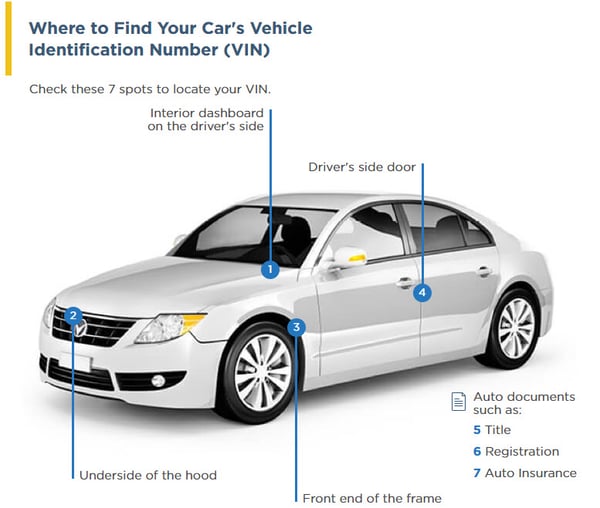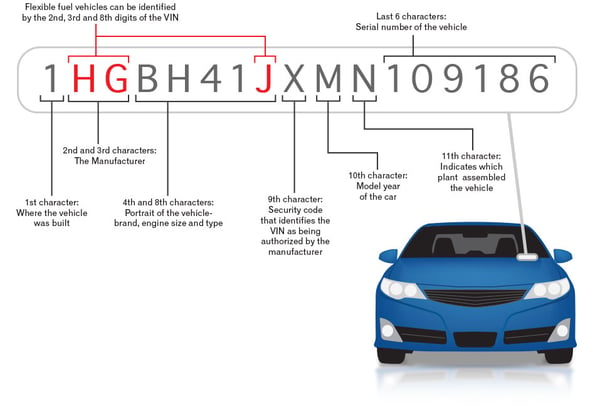- Carmoola
- Blog
- Tips and Advice
- What is a VIN Number?
- 🗞 Tips and Advice
- Last updated: May 30, 2024
- 6 Min Read
What is a VIN Number?
Written by

Verified by


See how much you can borrow in 60 seconds
| Representative Example | |
|---|---|
| Loan amount | £10,000 |
| Interest rate | 13.9% APR |
| 54 payments of | £246 |
| Total cost of credit | £3,284 |
| Option to purchase fee | £1 |
| Total payable | £13,285 |
Did you know that every vehicle has a unique identity code known as a Vehicle Identification Number or VIN? This 17-digit code is stamped into the chassis of the car and serves as a permanent identifier that cannot be changed.
Is the VIN important?
The VIN number is important for a variety of reasons. Here are some of its most important uses:
Track Car's History
Firstly, it allows you to track the history of the car, including its production details, previous owners, and any reported accidents or repairs. This information can be helpful when buying or selling a car, as well as for insurance purposes.
Prevent Theft and Fraud
The VIN number also helps prevent car theft and fraud, as it is a fixed identifier that cannot be altered or replicated.
In fact, many countries require that the VIN number be visible on the car's dashboard or windscreen to deter theft. Of course, it doesn’t always work.
You can check out our recent blog to discover what is happening to stolen cars in 2023.
What is a VIN, and where can you find it?
So, what exactly is a VIN number, where can you find it, and what information does it provide?
Don’t worry – we’ve got you covered! Discover everything you need to know about what a VIN number is in this info-packed blog. 🔎

A VIN, or Vehicle Identification Number, is a unique 17-digit code that serves as a car's unique identity code. Think of it like a fingerprint for your car.
It includes information about the country of origin, the manufacturer, and the specific make and model of the vehicle, as well as other important details such as the year of production, the engine type, and the serial number.
Where can I find a car's VIN?
The VIN number is usually stamped into the chassis of the car, though it can also be found in a few different locations depending on the make and model of the vehicle.
In most cars, you can find the VIN number on the driver's side dashboard, where it is visible through the windscreen.
You may also be able to find it on the driver's side door frame or in the engine compartment.
How is a VIN number used to identify a vehicle?
Once a car is sold, the VIN number is used to register the vehicle with the relevant authorities, such as the DVLA. This ensures that it is legally registered and taxed and that the correct owner information is on file.
The VIN number is also used by car dealerships to track the ownership and service history of a vehicle. This can help to ensure that the car has been properly maintained and serviced and can provide valuable information to potential buyers about the vehicle's condition and history.
What information is included in the VIN?

The VIN number is essentially a code that provides a wealth of information about the car. This includes details about the manufacturer, model, engine type, transmission, and more. Specifically, the VIN number can tell you:
- The manufacturer and country of origin
- The make and model of the vehicle
- The engine type and size
- The transmission type
- The vehicle's trim level and options
- The year the car was made
- The plant where the car was manufactured
- The unique serial number of the vehicle
It provides a comprehensive snapshot of a vehicle's specifications and history, making it an incredibly valuable tool for car buyers, sellers, and service centres alike.
Using the VIN Number to Check Car History
There are several ways to use the VIN number to check a car's history. One of the most common is to use an online vehicle history report service.
This will use the VIN number to provide a comprehensive report which can include information such as:
- Previous owners and registration history
- Accident and damage history
- Service and maintenance records
- Mileage readings and discrepancies
- Title and lien information
By checking a car's history using the VIN number, you can gain valuable insights into the vehicle's past and make an informed decision about whether to buy it.
This can be especially important when buying a used car, as it can help you avoid purchasing a vehicle with hidden issues.
When should you check the VIN number of a car?
If you're in the market for a used car, checking the VIN number should be one of the first steps you take.
By checking the VIN number before you buy a car, it can save you a lot of money and hassle down the road.
It also gives you peace of mind knowing that you're buying a car that has been well-maintained and cared for.
In addition to checking the VIN number before you buy a car, it's also a good idea to periodically check it. This will help to ensure that there are no issues with the vehicle's title or registration.
Read our blog to find out if you need an HPI check and learn more about what they can reveal.
Takeaway
A VIN number check is an important step in the car-buying process and should be done before you make a purchase.
By doing so, you can ensure that you're getting a reliable, legitimate and well-maintained vehicle that meets your needs and budget.
If you are in the market for buying a secondhand car, you can search for the best used cars now and start learning more about the best cars for you.
If you're looking for a more budget-friendly way to buy your next car, get an estimate using our car finance calculator! 😎
See how much you can borrow in 60 seconds
| Representative Example | |
|---|---|
| Loan amount | £10,000 |
| Interest rate | 13.9% APR |
| 54 payments of | £246 |
| Total cost of credit | £3,284 |
| Option to purchase fee | £1 |
| Total payable | £13,285 |
Related articles
Can you drive in the UK on a foreign licence?
If you’re new to the UK, you might be keen to get behind the wheel to explore on the open road. You can usually drive in the UK...
What happens if my car is written off and it’s still on finance?
Accidents happen. When split-second decisions and challenging conditions make driving difficult at the best of times, even the...
Which credit reference agencies do lenders use?
When applying for car finance, your credit score can make a significant difference to the APR you’re offered, your repayment...

.webp?width=832&height=592&name=customer-support%20(1).webp)










.webp?width=400&height=285&name=online-shoppers-with-dog%20(1).webp)


.jpg?width=500&height=356&name=Vintage%20car%20going%20to%20an%20old%20town-1%20(1).jpg)





